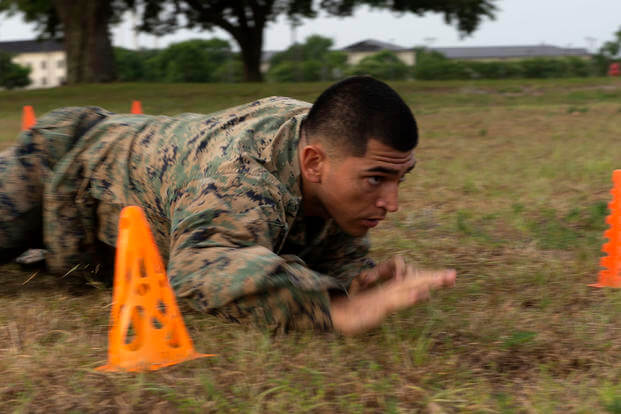CFT. When some Marines hear those three letters together, they might get a little nervous, sort of along the same lines as hearing the words "the gas chamber." On the other hand, some Marines may get excited. Nevertheless, the CFT is part of the Marine Corps now, so get ready to get some.
Expand your focus
Training for the CFT will be different than training for the physical fitness test. The CFT involves more explosive movements and uses a wider range of muscles.
"Don't try to prepare specifically for the CFT," said Capt. Roger Head, officer-in-charge of the Marine Corps' Combat Conditioning Program, Marine Corps Base Quantico, Virginia. "We have noticed Marines who train, especially for the physical fitness test, do well but can't perform as well on other physical tasks."
Sgt. Danielle C.K. Holladay, former chief instructor of the CCP, explained CFT workouts should be geared toward cross-training activities: shorter in duration but high in intensity. Also important are interval training and overall upper-body development.
Since the CFT consists of short duration activities, it's important to start training the body for maximum production during those times.
"This will help you increase your output before your muscles start to burn and your ability to process oxygen fades while conducting intense activities," Holladay said.
Build for a constant state of readiness
It is important to vary your workouts constantly as your body adapts to your routine. Varied training cycles create more effective workouts for your time and effort.
"Don't vary just the workout; vary the time between sets and the time of day you work out," Head said. "Your body wants balance in all things. If you vary your workouts, the body is always ready, never knowing when it will be asked to perform -- a constant state of readiness."
Train, eat, drink, repeat
Gunnery Sgt. Brian Woodall, chief instructor of the CCP, said it's important to take part in combat conditioning exercises five days a week for 30 minutes.
"This can include tire flips, buddy drags, fireman carry and buddy squats," Woodall said. "Also, use body-weight exercises such as pull-ups, sit-ups, push-ups, dips and lunges.
"Another key factor when working out and training for a physical challenge is giving your body the nutrition it needs to perform and recover from the exercises. This can be challenging to Marines who count on a mess hall for food."
Said Head: "Eating a small amount of carbohydrates and protein about 20 minutes before and after working out helps you recover faster and perform better."
During your workouts, the body will lose a lot of water. Replenishing your system is vital.
"As we all know, in the Marine Corps, hydration is very important," Head said. "You would be surprised how much drinking a gallon of water a day helps."
Stew Smith is a former Navy SEAL and fitness author certified as a Strength and Conditioning Specialist (CSCS) with the National Strength and Conditioning Association. Visit his Fitness eBook store if you're looking to start a workout program to create a healthy lifestyle. Send your fitness questions to stew@stewsmith.com.
Want to Learn More About Military Life?
Whether you're thinking of joining the military, looking for fitness and basic training tips, or keeping up with military life and benefits, Military.com has you covered. Subscribe to Military.com to have military news, updates and resources delivered directly to your inbox.



















